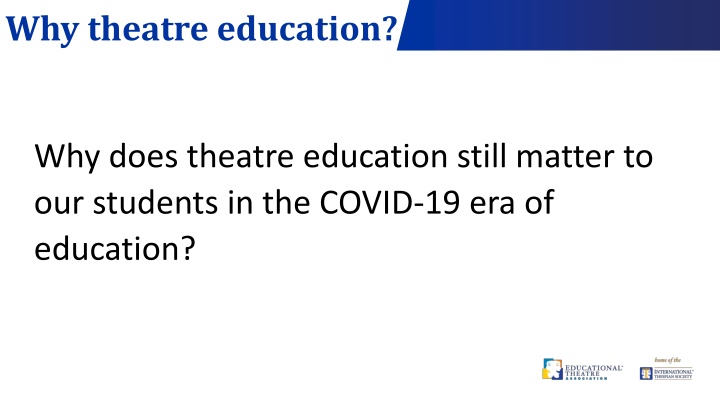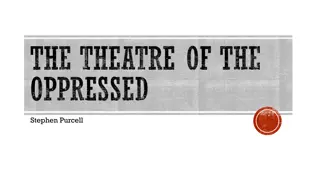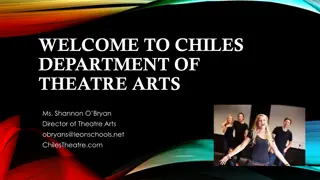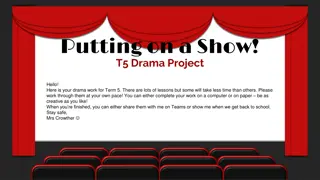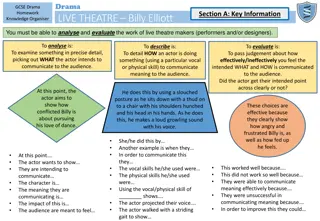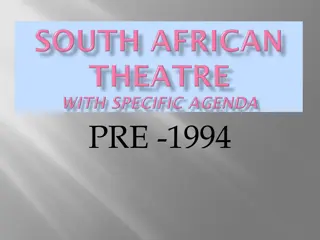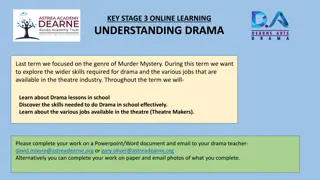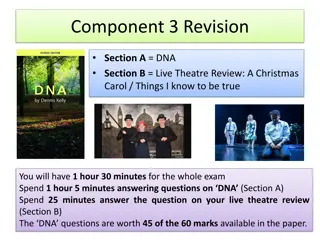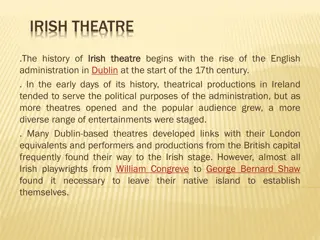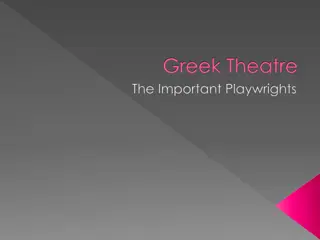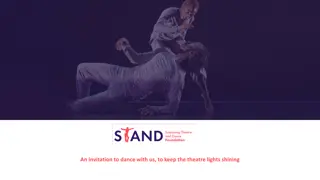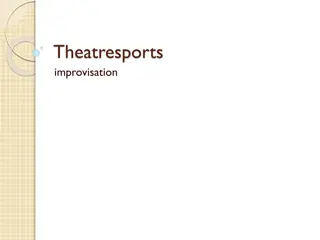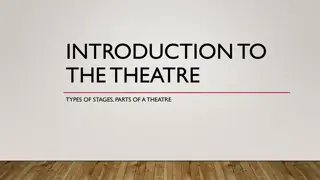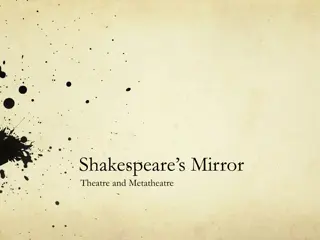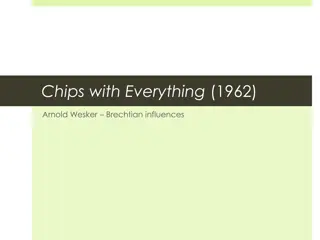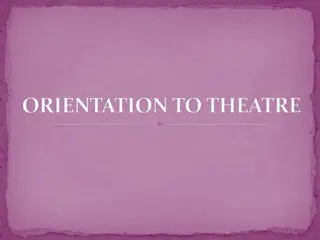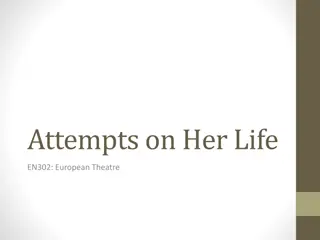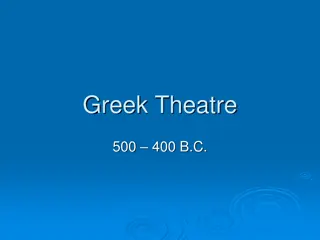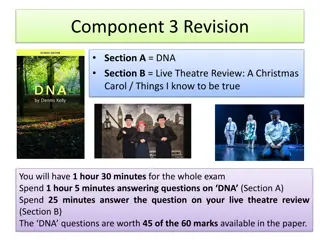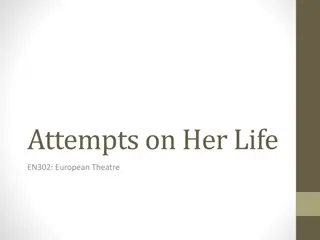Importance of Theatre Education in the COVID-19 Era
Amid the challenges of the COVID-19 era, exploring why theatre education remains relevant for students is crucial. Theatre fosters creativity, critical thinking, empathy, and communication skills - all vital in these times. The interactive nature of the performing arts offers unique opportunities for emotional expression and collaboration, even in virtual settings. Students benefit greatly from the personal growth and learning experiences that theatre education provides, enhancing their overall development and adaptability in a rapidly changing world.
Download Presentation

Please find below an Image/Link to download the presentation.
The content on the website is provided AS IS for your information and personal use only. It may not be sold, licensed, or shared on other websites without obtaining consent from the author.If you encounter any issues during the download, it is possible that the publisher has removed the file from their server.
You are allowed to download the files provided on this website for personal or commercial use, subject to the condition that they are used lawfully. All files are the property of their respective owners.
The content on the website is provided AS IS for your information and personal use only. It may not be sold, licensed, or shared on other websites without obtaining consent from the author.
E N D
Presentation Transcript
Why theatre education? Why does theatre education still matter to our students in the COVID-19 era of education?
Theatre education 1.Supports the social & emotional well-being of students. 2.Creates a safe and nurturing space within the school environment 3.Is part of the well-rounded education for all students as defined by federal law
Theatre students Critically think and problem-solve artistic, academic, and life challenges in both conventional and unconventional ways. Communicate in a variety of playmaking contexts to convey their own ideas and to interpret the ideas of others. Collaborateto cultivate diverse ideas, solutions, and common goals, both onstage and backstage. Create personally meaningful theatrical stories generated from a range of sources and ideas. Innovate and investigate throughdifferent approaches to traditional ideas to create new understanding.
Theatre students Evaluateinformation to reflect on its personal and artistic value. Adaptto changing circumstances in a variety of artistic and personal situations. Self-direct to manage their own learning goals and improve as theatrical artists. Empathize with peers to build respectful and effective socially and culturally diverse teams working towards a common goal. Leadto build trust, demonstrate integrity, and inspire others to model ethical behavior that benefits their school and broader community.
The Research 97% of school administrators believe that theatre experiences help increase students understanding of the world. 2012 EdTA-Utah State University Survey of Theatre Education Programs in U.S. High Schools https://www.schooltheatre.org/advocacy/landscapesurvey High poverty students with sustained involvement in theatre show substantial improvement in reading proficiency, gains in self-concept and motivation, and higher levels of empathy for others. Doing Well and Doing Good by Doing Art, 2009 http://www.amazon.com/Doing-Well-Good-Art-Longitudinal/dp/1616234792 Training in acting classes improves language and memory skills. Learning, Arts, and the Brain, The Dana Foundation, 2008 http://www.hewlett.org/uploads/files/Learning_Arts_and_the_Brain.pdf
The Research Middle school students who participate in drama programs are less likely to engage in risky, delinquent, and/or violent behaviors. Whole brain learning: The fine arts with students at risk, 2006 http://www.artsedsearch.org/summaries/whole-brain-learning-the-fine-arts-with- students-at-risk Theatre can help young students build understanding of scientific practice concepts. https://www.artsedsearch.org/study/science-and-theatre-education-a-cross- disciplinary-approach-of-scientific-ideas-addressed-to-student-teachers-of-early- childhood-education/ Students highly involved in theatre are more likely to be reading at a high level of proficiency by grade 12. Doing Well and Doing Good by Doing Art, 2009 http://www.amazon.com/Doing-Well-Good-Art-Longitudinal/dp/1616234792
The Research Americans for the Arts 2019 Study
The Research Americans for the Arts 2019 Study
Arts Education is Essential It is imperative that all students have access to an equitable delivery of arts education that includes dance, media arts, music, theatre, and visual arts that supports their educational, social, and emotional wellbeing, taught by certified professional arts educators in partnership with community arts providers. https://www.schooltheatre.org/advocacy/national/researchandreports
21st Century Skills Map Business leaders and visionary thinkers concerned about preparation of students for the future know that the ability to be creative a key 21st Century Skill is native to the arts and is one of the primary processes learned through arts education. The examples in the Skills Map illustrate how the arts promote work habits that cultivate curiosity, imagination, creativity, and evaluation skills https://files.eric.ed.gov/fulltext/ED519500.pdf
Recommendations for Reopening School Theatre Programs EdTA strongly urges districts to continue to retain their trained and certified theatre educators in a time when the social and emotional health safety of our students is so important. https://higherlogicdownload.s3.amazonaws.com/SCHOOLTHEA TRE/7f9e7fa8-ea41-4033-b6a3- 1ce9da6a7b6f/UploadedFiles/HPVMgpNDTw2FWro1JLiL_EdTA_ ReOpen_Guide_2020_FINAL.pdf
Smith High School Theatre Program On average, spends $10,000 annually for services and goods provided by local businesses Held a series of post-show community talk backs for our 2019 production Ragtime. Student company members earned $150,000 in college scholarships in 2019 Students company members have a 100% graduation rate between 2010-19. More than $5,000 was raised through a digital Best of Smith production in support of PPE for County Med Center
Our mutual challenge How can our school district safely resume theatre education under our state and local public health rules?
